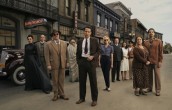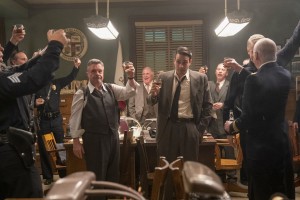
Nathan Lane as Lewis Michener and Daniel Zovatto as Tiago Vega in PENNY DREADFUL: CITY OF ANGELS – Season 1 – “How It Is With Brothers” |©2020 Showtime/Warrick Page
PENNY DREADFUL: CITY OF ANGELS has its entire first season now available via Showtime on Demand and Showtime through Amazon Prime. Like its predecessor, PENNY DREADFUL, PENNY DREADFUL: CITY OF ANGELS is created by John Logan and combines supernatural horror with history.
With PENNY DREADFUL: CITY OF ANGELS, we’re in 1938 Los Angeles, where the nihilistic demon Magda (Natalie Dormer) adopts various guises to further murder and violence, opposed by her sister, the Angel of Death, or Santa Muerte (Lorenza Izzo). Most of the community is unaware of this clash, but they’re caught up in increasing tensions between the L.A.P.D., the city council, and the Latinx community. Added to this is encroaching Nazi influence on already-racist politicians and power players. Caught in the middle is the first L.A.P.D. Latinx homicide detective, Tiago Vega (Daniel Zovatto), and his partner, Jewish veteran detective Lewis Michener (Nathan Lane).
Roxann Dawson directed Episode 5, “Children of the Royal Sun,” and Episode 6, “How It Is With Brothers.” In “Children of the Royal Sun,” Tiago and Lewis investigate the killing of a rapacious cop, unaware that the perpetrator is Tiago’s younger brother Mateo (Johnathan Nieves), who is under the sway of Magda in her guys as the agitator Rio. In “How It Is With Brothers,” Tiago and Lewis question Tiago’s friend Diego (Adan Rocha). By now, Tiago knows the truth, but can’t bear to arrest Mateo for it.
Dawson, born in Los Angeles, began her television career as an actress. Her best-known character is likely Lt. B’Elanna Torres, the role she played for seven years on STAR TREK: VOYAGER. Dawson got her start directing TV on that series in 1999, helming two episodes. Dawson subsequently directed ten episodes of STAR TREK: ENTERPRISE, and has since worked as a director across virtually all genres, including episodes of CROSSING JORDAN, LOST, COLD CASE, HEROES, THE CLOSER, THE MENTALIST, MAJOR CRIMES, AGENTS OF SHIELD, MERCY STREET, HOUSE OF CARDS, THE AMERICANS, THE DEUCE, THIS IS US, and THE MORNING SHOW. In 2019, Dawson made her feature directing debut with the drama BREAKTHROUGH, starring Chrissy Metz, Josh Lucas, Topher Grace, and Mike Colter.
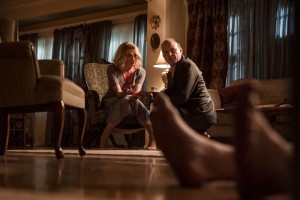
Natalie Dormer as Elsa and Rory Kinnear as Peter Craft in PENNY DREADFUL: CITY OF ANGELS – Season 1 – “Children of the Royal Sun” |©2020 Showtime/Warrick Page
In an exclusive phone interview, Dawson talks about her work on PENNY DREADFUL: CITY OF ANGELS, and her career overall.
ASSIGNMENT X: Had you seen the original PENNY DREADFUL before you were hired to direct PENNY DREADFUL: CITY OF ANGELS?
ROXANN DAWSON: You know, I hadn’t when I got hired. But I went back and looked at it, and it was such an extraordinary series, I just binged it, and I fell in love with the storytelling, even though I was told it was nothing like what we were going to be doing. I just fell in love with John Logan’s ability to tell the most amazing stories, the acting – oh, my goodness. It was just phenomenal.
AX: The two episodes you directed of PENNY DREADFUL: CITY OF ANGELS, Episode 5 and Episode 6, aired consecutively. Did you shoot them consecutively, or did you have a break in the middle?
DAWSON: No, I shot them at the same time. We cross-boarded them, and they’re very different, but we were literally shooting them, sometimes scenes from each one in the same day, depending on our locations. It was important to keep that in mind, because they really were very different stylistically, and in the way the story was being told.
AX: It’s okay, I can look it up. Did you have to do any research on any aspect of what the story is touching on, whether it was the culture of the time, or the L.A. freeway system – part of the story is about how Los Angeles got the 110 Freeway – or …?
DAWSON: There’s an amazing book called THE MIRAGE FACTORY [by Gary Krist] that was recommended to me that I devoured before I began shooting. It was so informative of the era, and all these fabulous stories. I can see why John Logan was attracted to wanting to tell these stories, because it’s an amazing period of time. But yes, I did my research – and actually, I grew up in L.A. and did not know a lot of this. It was fascinating to me. I love that about my job, because it’s an excuse to learn.
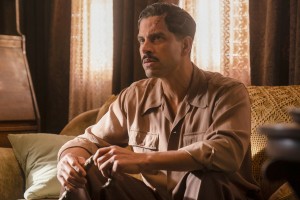
Adam Rodriguez as Raul Vega in PENNY DREADFUL: CITY OF ANGELS – Season 1 – “Children of the Royal Sun” |©2020 Showtime/Warrick Page
AX: What were some of the specific challenges in directing the PENNY DREADFUL: CITY OF ANGELS? By the time you did your episodes, they’d already shot the pilot, so there was a look and a tone that I’m assuming they wanted matched, and I’d imagine it was complicated figuring out your schedule for doing two episodes where you’re shooting scenes for both …
DAWSON: Well, I shot two episodes concurrently, and that in itself is a challenge, but a challenge I don’t mind. I think if I’m working on a show that I believe in, I enjoy the challenge. It gets me going [laughs]. “Can I make this work? Can I make this happen? Can I make two episodes at the same time, one that has sixteen pages in an interrogation room with no windows, and all the walls look the same? Can you do that at the same time as the other episode, which is soaked in chase scenes and dancing?”
You have to remember where you’re at, and how you’re going to treat these stories, which are different in their approach. But that’s what we do. That’s what excites me. In anything that I choose to do, I go, “Yeah, I want that challenge.” And I love this challenge, because I love the writing, I love the actors, I love the period. And even though it was somewhat of a trial set, I felt quite a bit of excitement in creating what I wanted to create, and then getting [the end result]. It was good.
AX: How was doing that interrogation sequence? It’s grueling to watch. Between takes, was the atmosphere on the set very sober, or did people have to break and relax, in order so that they weren’t punching the walls by the end of the day?
DAWSON: It was pretty sober. The first a.d. gave us days in between. We tried to shoot in continuity, and for the most part, we did, and separated it into sections on different days, so that the actors weren’t tackling the entire sixteen pages in one go, in one scene. Plus, my choice was to shoot it differently in terms of lenses and movement of the camera. I didn’t want to shoot all sixteen pages [from] one side, and then come back [and just shoot the reverse]. So we really were separating them into, I guess you could call it, emotional segments, and getting to work on those bits. But it was sober – well, Nathan, there are always jokes on the set when Nathan is there [laughs]. He’s amazing. But for the most part, it was pretty sober. These were difficult scenes, and so much of it was occurring in reactions, and not necessarily on the lines.
So much was about how information was hitting each of these people, as they were each figuring things out that the audience already knows, but we’re watching them like things in a petri dish, going, “Well, how do they get [through this]?” We actually know what the story is, but they don’t know, which is a really interesting way to write, for John to write a scene, where we know everything that’s going on, but they don’t. The only thing we don’t know is what the final response will be. And you really earn it by that point, watching all these characters slowly be able to get the information. Finally, everyone is on the same page at the end, pretty much. But that’s direction. You know it needs to be tackled in a respectful and a sober way.
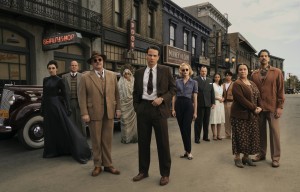
Natalie Dormer as Magda, Rory Kinnear as Peter Craft, Nathan Lane as Lewis Michener, Lorenza Izzo as Santa Muerte, Daniel Zovatto as Tiago Vega, Kerry Bishé as Sister Molly, Michael Gladis as Charlton Townsend, Jessica Garza as Josefina Vega, Johnathan Nieves as Mateo Vega, Adriana Barraza as Maria Vega and Adam Rodriguez as Raul Vega in PENNY DREADFUL: CITY OF ANGELS – Season 1 |©2020 Showtime/Jim Fiscus
AX: Did you work with anybody on CITY OF ANGELS that you’d worked with previously?
DAWSON: You know, I always crossed paths with somebody, but nobody in terms of hiring. I hadn’t worked with John Logan or Michael Aguilar. Actors – Brent Spiner [who plays police captain Vanderhoff] I knew [laughs], but no. Which is kind of unusual, actually, not to have anybody that I’ve worked with before. But they were so fabulous, and so willing to take direction, and very inspiring to work with.
AX: I’m profoundly impressed by the moral authority of Adriana Barraza, who plays the Vega matriarch Maria. She can convey so much without even saying anything …
DAWSON: She is one of the most brilliant actors that I’ve ever worked with. What she can say, the levels she can play, on a single line or in a glance, the complexity behind her eyes – there are certain actors that can think loudly. She’s the queen of the eyes. What she does to you is amazing.
AX: How do you work with the actors generally? Were they mostly settled into their characters by the time you got there, or do any of them come to you and say, “What do you think of this?”
DAWSON: So we rehearsed the scenes, discussed the scenes, but you want to make sure that the actors don’t over-intellectualize things too much. The interesting thing about doing theater is that you’ve got six weeks of rehearsal before you put it up on its feet in front of an audience, and there is time to intellectualize, and so a performance can get very heady, and then you move past that, and go back to your gut. You don’t have that time in TV. So it’s very important that, if you’re going to intellectualize a scene and discuss it, that you do that and get on with that scene quickly, because you want the discovery to be happening in the room, out there, as I’m working.
[Especially for the interrogation scene], everybody has secrets. What you don’t want to do is sit down and discuss what everybody’s secrets are. You want to be able to play your secrets well. So there’s a lot of discussion with actors individually that can then bring something back to the scene that was new, and you could see how the other actors reacted to them. But so much of this is listening, basic acting tools, you know? Really listening [elevates] the best writing in the world.
AX: Do you still do any acting at all?
DAWSON: I don’t. And I don’t miss it. I have a lot of respect for actors. The only time I miss it is when occasionally, to be honest [laughs], I see an actor that I can’t get to do what I want them to do, and I go, “Oh, I want to get in there and just do it myself.” Part of it is, “How do I phrase this [direction] so they can own that?” But I don’t really miss acting. I certainly don’t miss the business of acting. But I love the fact that I have that in me, because I have so much respect for the actors that I’ve worked with. I know how difficult it is, I really do. And hopefully, the actors that I’ve worked with know that I understand that, and I can earn their respect in that way, because I really do respect them. I get it. I know what it is that they’re going through.
AX: When you’re directing, do you have actors who want to make the transition to being directors themselves come up and ask you questions?
DAWSON: Yeah. I remember on HOUSE OF CARDS, Robin [Wright] was asking me a lot of questions. She was going to direct her second episode. And then on THIS IS US, Milo [Ventimiglia] was about to direct, so he was asking a lot of questions. Which I love. I think that acting is a very myopic profession, and it needs to be, because you have to deal with just your piece of the pie. And as a director, you kind of have to be out of yourself, and really look at the pie as a whole. And I remember the first time I went back to acting after I had directed, and as an actor, suddenly I was like an angel [laughs]. I saw how you worked with the director, and suddenly that was what I really wanted to be, the nicest actor possible for the director, because I knew how hard this was.
AX: You came up as a director at a time when not only were there not many women directors, let alone Latinx women directors, but when diversity in hiring wasn’t really being discussed, much less implemented. Has that growing consciousness benefited you at all, or have you just steadily been able to go forward from when you started?
DAWSON: When I started, there were only some women directors. But I didn’t see it at that time, when I was in that moment, as an obstacle. It wasn’t really being discussed. I actually just kept moving. I think it’s tough for everybody. Now there are a lot more opportunities. I think it’s a double-edged sword. I think sometimes there are obligations to meet a quota. It’s hard to go in and be as respected, because people think that you’re filling a quota. It’s really people’s perceptions, but I know that maybe we do need to do this. We’ve progressed quite a bit since I began directing, but it’s so tough. I’ve seen many men brought to their knees. I saw men crying in the wings, who couldn’t make their day, expecting to be fired. So when I was just starting out, I just thought it was normal, and I was ready to face those challenges, because I really love doing this.
So now, sometimes, you can come onto a show and you go, “Are you here because you’re …” – less so for me, because I feel like I’ve done it long enough – but, “Are you here because you’re filling a quota, or are you here because you actually deserve to be here?” So it is a double-edged sword for women in the business right now. And sometimes I think it’s difficult for the women involved.
AX: That they’re asked to represent an entire community, or segment of the population, rather than just themselves?
DAWSON: Well, yes, and also because there was a time where you’d hear the question about whether you earned this position, or you were just handed it. I didn’t have to face that when I was starting, because I had to earn it. There were no quotas. I still remember sitting down and hearing, “We hired a woman and it didn’t work out.” So that’s why they weren’t going to hire me on a show. But that was probably the most that I ever heard of an anti-woman kind of bias. Other than that, I just figured, “I just have to work hard, because I have to prove myself.” And that’s what I did, and people started realizing that they wanted to hire me because I knew what I was doing. Nobody ever felt an obligation to hire me, ever. I know we need to do this to make a change, because maybe the changes aren’t being made fast enough. But at the same time, it’s really tough on the women who are being given these challenges.
AX: Last year, you directed your first feature film, BREAKTHROUGH, a fact-based drama about a young man who survives drowning. How was that experience?
DAWSON: It was extraordinary. It was probably the best experience so far that I’ve had directing, because it really was my vision, and I was able to take the script and be very supported in terms of what I wanted to do with it. It was thrilling from beginning to end, and followed through that way. You don’t get to do that in episodic television, unless it’s your baby from the beginning and you’ve developed it. But this feature meant a lot to me. It taught me a lot, and it fulfilled me.
AX: Do you have anything else coming up that we should know about?
DAWSON: I’ve got two projects that are going, that I can’t talk about, but I’m very excited about working on them throughout this whole virus shutdown. So hopefully we’ll get back to shooting soon.
AX: And what would you most like people to know about your work on PENNY DREADFUL: CITY OF ANGELS?
DAWSON: I guess just watch the episodes. Hopefully, they speak for themselves. I’m proud of both of them. I think they’re very stylistically different, and tell very different stories, but I hope that my direction services the material. And I think the actors are also proud of their work, which is always a high honor, and a compliment when I hear that from the producers, that the actors are really pleased with the final cut.
Related: Exclusive Interview with PENNY DREADFUL: CITY OF ANGELS star Adam Rodriguez on Season 1 – Part 2
Related: Exclusive Interview with PENNY DREADFUL: CITY OF ANGELS star Adam Rodriguez on Season 1 – Part 1
Related: Interview with PENNY DREADFUL star Timothy Dalton on Season 2
Related: Interview with PENNY DREADFUL creator John Logan on Season 2
Related: Interview with PENNY DREADFUL creator John Logan on Season 1
AGREE? DISAGREE? LET YOUR VOICE BE HEARD IN THE COMMENTS!
Follow us on Twitter at ASSIGNMENT X
Like us on Facebook at ASSIGNMENT X
Article Source: Assignment X
Article: Exclusive Interview with PENNY DREADFUL: CITY OF ANGELS director Roxann Dawson on Season 1 episodes
Related Posts:




